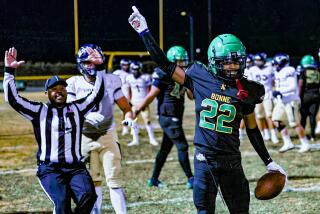Alabama Put on Probation : College football: NCAA sanctions program for three years. The team is banned from postseason play next season.
- Share via
Alabama, with the third-winningest program in major college football history, was placed on three years’ probation and severely penalized after the NCAA Committee on Infractions found the school guilty of unethical conduct and “a distressing failure of institutional control.”
The sanctions, made public Wednesday, also require Alabama to reduce its football scholarships from the maximum 85 to 81 for the next two seasons, reduce its freshmen and transfer player scholarships by 22 during the next two seasons, forfeit eight victories and a tie from the 1993 season and forfeit any chance to appear in postseason play this year.
In addition, the Committee on Infractions ordered four school officials, including Coach Gene Stallings and Athletic Director Cecil (Hootie) Ingram, to attend a regional rules compliance seminar during each of the next three years.
“I was, to put it a simple way, somewhat stunned by the [NCAA] report,” Ingram said during a Wednesday news conference.
Alabama President Roger Sayers, calling the penalties “far beyond what [the] facts warrant,” said the school will request a review by the NCAA Infractions Appeals Committee, which is separate from the committee that imposed the sanctions. Alabama, whose football program has never been on NCAA probation, has 14 days to appeal.
“This issue isn’t over yet,” Sayers said. “These penalties are not final. We think we have a strong case to make to the committee, and we will make it.”
Alabama doesn’t dispute the core of the initial NCAA investigation: that Antonio Langham, then a Crimson Tide junior defensive back, signed with an agent after the team’s national championship victory over Miami in the Sugar Bowl on Jan. 1, 1993; and that former Alabama running back Gene Jelks received six loans for a total of $24,400 based partly on his future earnings as a professional player. School officials and the NCAA enforcement staff submitted a summary-disposition report, which is a joint acknowledgment that the violations occurred.
But the Committee on Infractions wasn’t satisfied with the report and ordered hearings on the matter. After conducting the hearings, the committee decided that Ingram, Stallings, faculty representative Dr. Thomas Jones and then-compliance director Gary White had failed to investigate Langham’s situation properly.
Langham played in 11 regular-season games in 1993 before he was ruled ineligible for the Southeastern Conference championship game, which Alabama lost to Florida, and the Gator Bowl, in which the Crimson Tide defeated North Carolina. Under NCAA rules, he should have been ineligible for the entire season. Alabama’s record thus fell from 9-3-1 to 1-12.
In its release Wednesday, the committee said Jones provided “false and misleading” information to the NCAA eligibility staff, which constituted unethical conduct. It also criticized the university for its failure to uncover the existence of Jelks’ loans.
“The university admitted the first two violations,” said David Swank, a University of Oklahoma law professor who is chairman of the committee on infractions. “The part not admitted was the individual responsibility.”
Alabama athletic department officials maintain that the errors, while serious, were “unintentional and inadvertent.” Stallings, who received a letter of admonishment from Sayers, said the program is being punished partly because he trusted Langham to tell the truth. Stallings added that he did not consider it his job to become an investigator.
“I’m not a detective, and I don’t want the NCAA to make a detective out of me,” he said.
Asked later if this would affect his coaching timetable, Stallings said: “It sure will. I’ll have to stay that much longer to win those [eight] games back.”
Sayers said Alabama will appeal the issue of unethical conduct.
If the sanctions stand, Alabama, which is expected to be ranked in the preseason top 25, would lose its share of the SEC bowl revenue and the SEC championship game revenue. Last year, SEC teams generated $5 million from bowls and $4.3 million from the championship game, with each team receiving about $775,000.
More to Read
Go beyond the scoreboard
Get the latest on L.A.'s teams in the daily Sports Report newsletter.
You may occasionally receive promotional content from the Los Angeles Times.










